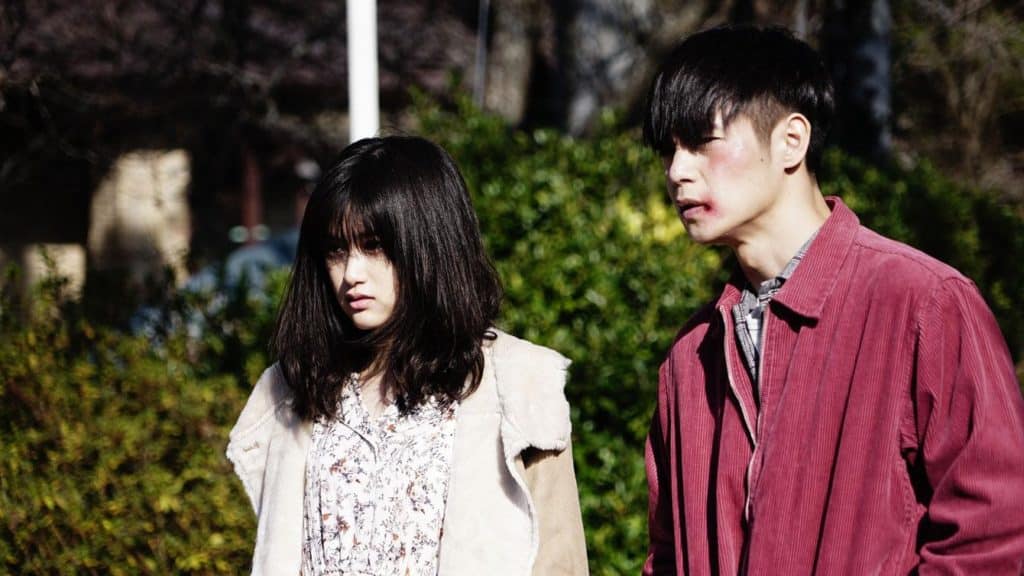
Yakuza films are violent, sexy, and more violence piled on for good measure. When they come from Yakuza film king Takashi Miike, this is doubly-so with most of his films focussing on absurd effects, rolling heads, and little to no storyline. Now, this isn’t a bad thing. As a huge fan of American exploitation and Mexploitation cinema, this is right up my alley and it’s why I’ve seen well over 20 of Miike’s 100-plus credits. But it’s because of this that I walked into the Fantastic Fest screening of his newest film, First Love, prepared for violence but not for the emotional gut-punch it would deliver.
Although First Love opens with decapitation and a rolling head, it ends with, well, a love story. Taking place over the course of one night, the film centers on Leo (Masataka Kubota), a young boxer who was recently given a countdown on his life after a blackout in the ring sends him to the doctor. As he sulks through the streets of Tokyo he meets Monica (Sakurako Konishi), a call girl and addict who become involved in a drug-smuggling scheme to pay off her father’s debt. When Monica escapes, she unwittingly pulls Leo into a large-scale gang war as they’re pursued by a corrupt cop, yakuza, and the Chinese triads.
First Love is a lot of things. It has actioned fueled by cocaine, it has female characters who outmatch many of the men in strength, it’s a Yakuza film like many of Miike’s works, it’s a tender love story, but it’s also an emotional look at trauma and PTSD. The king of Yakuza films, I expected the absurdity, violence, and humor in First Love, but I didn’t expect it to highlight overcoming trauma in such a detailed way.
Monica, sold into prostitution to the Yakuza by her father, is an addict, using the crime organization’s drugs to quell her trauma. Sexually abused by her father, we see her hallucinate the man who hurt her as she cycles off of the drugs. Walking with her John, a corrupt cop who has plans to use her to steal cocaine from the Yakuza, she stops in her tracks. Her father in his underwear appears. He taunts her and she runs, terrified of the man who abused her.
Truthfully, Monica’s hallucinations can be looked at as effects of the drugs and the withdrawal she begins to experience at the start of the film. But while we don’t hear PTSD used to describe Monica, the conversation she has with Leo as he helps her cope with the visions of her father resemble grounding techniques I was taught to help me out of spirals. In fact, one scene of First Love sticks out above all the rest.
Sitting on a train after running off together, Monica begins to panic as she sees the image of her father coming down from through the cars. Leo sees the painful stress on her face. She wants to run. She wants it to stop. As a solve, Leo offers her his headphones. The music that she hears as he approaches causes him to match it. Instead of just stalking her, he begins dancing. Monica laughs through tears.
But the moment is also funny. Asking her if it’s funny, Leo solidifies a concept that I carried with me out of the film: “painful but funny.” This line is an acknowledgment of coping, without erasing the pain that sits under the surface. By making her demon dance she can stand it, but it’s still painful, as any confrontation is.
Throughout the film, First Love balances the painful and the funny as Miike puts his characters through physical and emotional wringers. The film is violent, it’s absurd, and yet the same director who delivers a Yokuza double-crosser rubbing cocaine into his wounded abdomen for a jolt of energy to fight – and later just to feel good – also never loses sight of Monica’s positionally as a woman processing. In all of the guns and blood and hardware store fighting, there is a tender heart to First Love that makes it one of the best films of 2019. As the story progresses, Monica remains haunted, but as it progresses she begins to take back control from her specter. Pushing back the pain, focussing on the funny, and leaning on Leo to do so.
First Love is a film that is more than just one thing, it crosses through different genres, it delivers different themes, but the takeaway for me, as someone who deals with mental health episodes, is that finding the funny to soothe the pain is how we survive. Finding ways to balance our hurt is how we find solace and hope. It also gives us control. Truthfully, I didn’t expect this much heart from a Yakuza film, but damn am I glad I got it.






